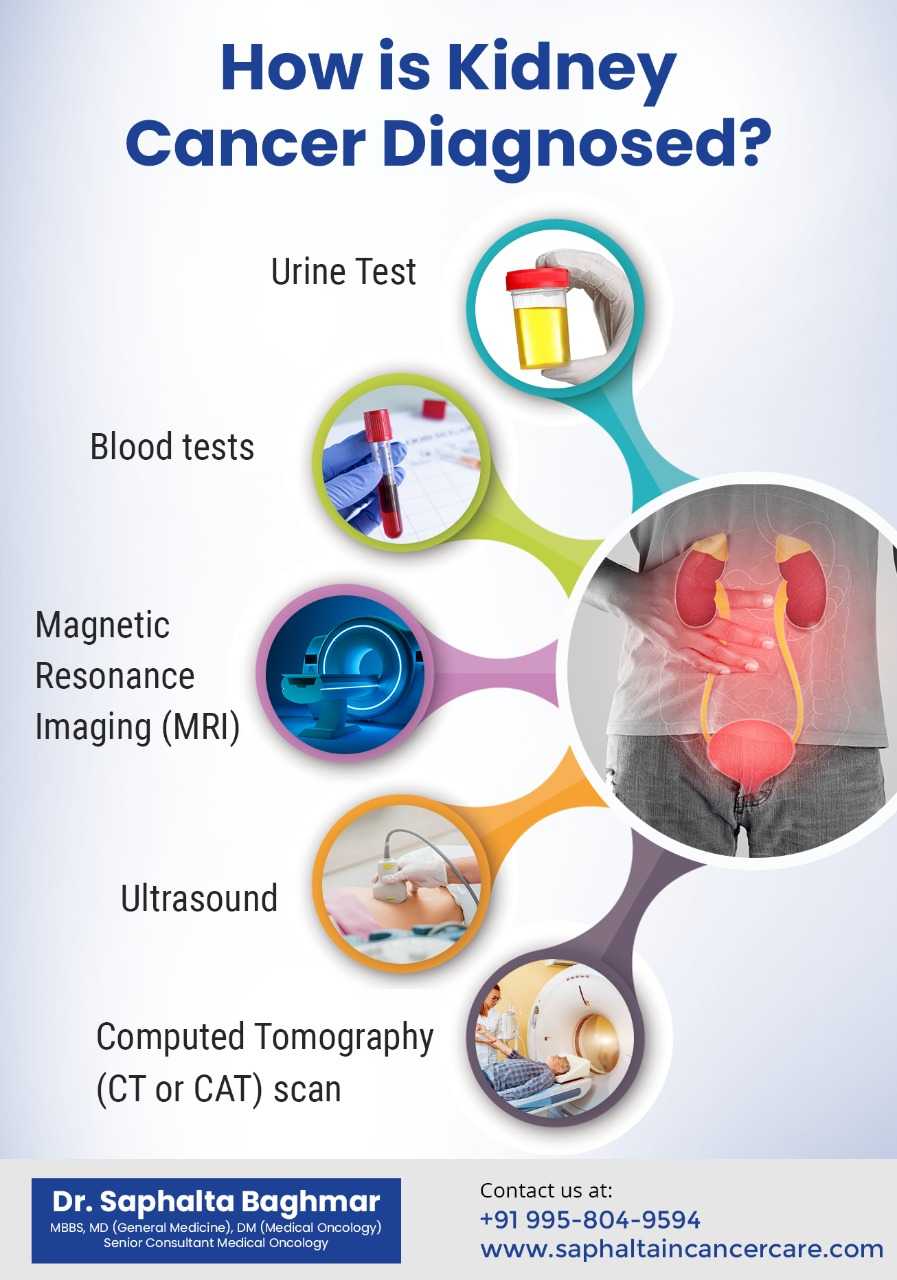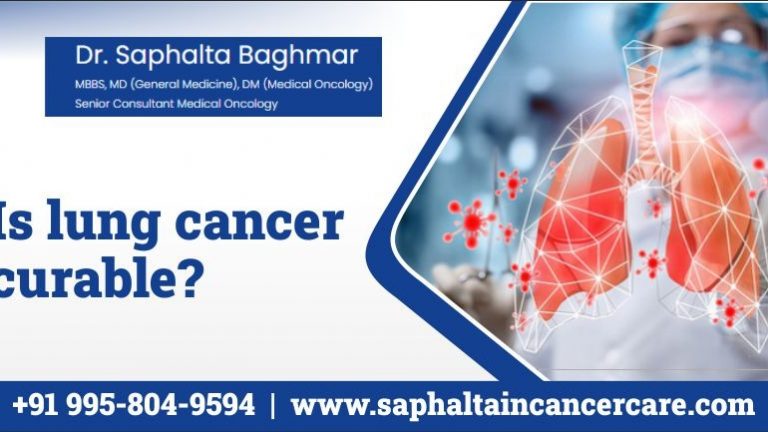“Dealing with cancer is challenging, I aim to treat patients with utmost care and professionalism and help them in winning over cancer”~ Dr. Saphalta Bhagmar
Kidneys are the two bean-shaped organs that filter blood and are located in the abdominal region on either side of the spine. Cell division is a normal process in our bodies, but when it becomes uncontrollable, it results in the growth of a tumor and, eventually, cancer. The process of uncontrolled cell division in kidneys leads to kidney cancer.
What are the symptoms of kidney cancer?
The symptoms of kidney cancer are not noticeable at the early stages and are often found accidentally through CT scans of other organs, hence it is frequently detected at an early stage when it is restricted to the kidney only. Continue reading ahead to know about the symptoms of kidney cancer in depth.
1. Early Symptoms of Kidney Cancer
Lack of symptoms is one of the numerous reasons that cancer is rarely discovered in its early stages. Similarly, the symptoms of kidney cancer do not appear until the illness has advanced to a later stage. However, here are some of the early signs and symptoms of kidney cancer that may be of concern:
- prolonged back discomfort, particularly below the ribcage,
- blood in the urine
- stomach pain
- bloating in the abdomen
- Swelling in the abdomen
- Excess fatigue
- Flank pain
- Recurrent fevers
- Sudden unexplained weight loss
- Anemia
- Enlarged veins in the testicles (varicocele), a symptom of kidney cancer in males
- High Blood pressure levels
Causes
While the actual and specific cause of kidney cancer is still unknown, some risk factors, such as smoking, obesity, and heredity (family history of cancer) are significantly associated with the illness.
General Health causes:
Age: As people get older, their chances of acquiring kidney cancer rises.
Gender: Men have an increased chance of developing kidney cancer than women.
Obesity: Excess weight is a hub of diseases and hence might raise chances of developing kidney cancer.
High blood pressure: People who have high blood pressure are at a higher risk of developing kidney cancer.
Dialysis: People who have been on dialysis for a long period are more likely to get kidney cancer.
Genetic causes:
People with a family history of genetic abnormalities or inherited genetic syndromes are more likely to develop kidney cancer. Following are some of the syndromes associated with the prevalence of kidney cancer:
- Von Hippel-Lindau disease, a genetic abnormality that results in kidney tumors.
- Hereditary papillary renal cell carcinoma, a kind of kidney cancer that commonly affects both kidneys.
- Birt-hogg-Dube syndrome is a cutaneous disorder that affects hair follicles and is linked kidney tumors
- Hereditary renal oncocytoma is a form of kidney tumor with a minimal chance of progression to cancer
- Hereditary leiomyoma renal cell carcinoma is an uncommon gene mutation that produces skin lumps and, in women, fibroids in the uterus.
Lifestyle causes:
Tobacco use: ingestion of tobacco increases the risk of getting kidney cancer.
Occupational exposure: Asbestos and/or cadmium (a kind of metal used in the manufacturing of batteries, plastics, etc.) exposure might raise the chances of acquiring kidney cancer.
2. End-Stage Symptoms of Kidney Cancer
The symptoms of end-stage kidney cancer develop when the kidney has been suffering for a long time and when it starts worsening. Following are those symptoms:
- Changes in the skin and nail color, either too pale or too dark
- Joint aches
- Drowsiness
- Confusion
- Difficulty in focusing
- Numbness in the extremities of the body
- Changes in breath odor
- Bruising
- Bleeding nose
- Presence of blood in the stools
- Increased thirst
- Recurring hiccups
- Decreased libido
- Insomnia
- Nausea
- Swelling of the extremities
3. When To See Your Doctor?
If you are experiencing any of the early symptoms of kidney cancer that are mentioned above, it is highly advisable to contact your doctor. Apart from other questions, your doctor will need to know how long and how regularly you have been experiencing the symptoms (s). This is done to aid in the identification of the cause of cancer.
If cancer is discovered, the major aim is towards resolving the symptom which is a critical component of cancer treatment and therapy. This is termed palliative care or supportive care. It is often started soon after diagnosis and continues throughout treatment. Schedule an appointment with your doctor to address and discuss your early symptoms of kidney cancer.

4. Faq
What are the signs of kidney cancer in adults?
The common signs of kidney cancer in adults are blood in urine, abdominal pain especially near the ribcage, fatigue, unexplained weight loss, anemia, flank pain, etc.
Is Kidney Cancer Curable?
Kidney cancer is usually treatable if diagnosed early. Even in the most advanced stages, new therapies and procedures have resulted in significantly higher overall cure rates.
What are the different types of kidney cancer?
There are numerous types of kidney cancer and there are more than 30 kidney cancer cells. The different types of kidney cancer are:
- Renal cell carcinoma (This is more prevalent in adults)
- Urothelial carcinoma
- Wilms tumor (mostly seen in children)
- Lymphoma
Tests For Diagnosing Kidney Cancer
There are several tests devised to diagnose kidney cancer and it includes :
- Blood test
- Urine test
- MRI
- CT/CAT scan
- Cystoscopy
- Biopsy
- Nephro-ureteroscopy
Take Away
The symptoms of kidney cancer are difficult to detect at first. Dr. Saphalta Baghmar’s clinic is equipped with leading technologies and a dedicated staff that facilitates the early identification of cancer and gives appropriate treatment. Dr. Saphalta is a Best cancer specialist in Delhi NCR region with experience of over 11 years. The clinic has extensive training in treating cancer patients with care. With the availability of special cancer therapies and cutting-edge technologies, in the clinic, Dr. Saphalta Baghmar’s clinic is a one-stop solution for all the oncology problems.

